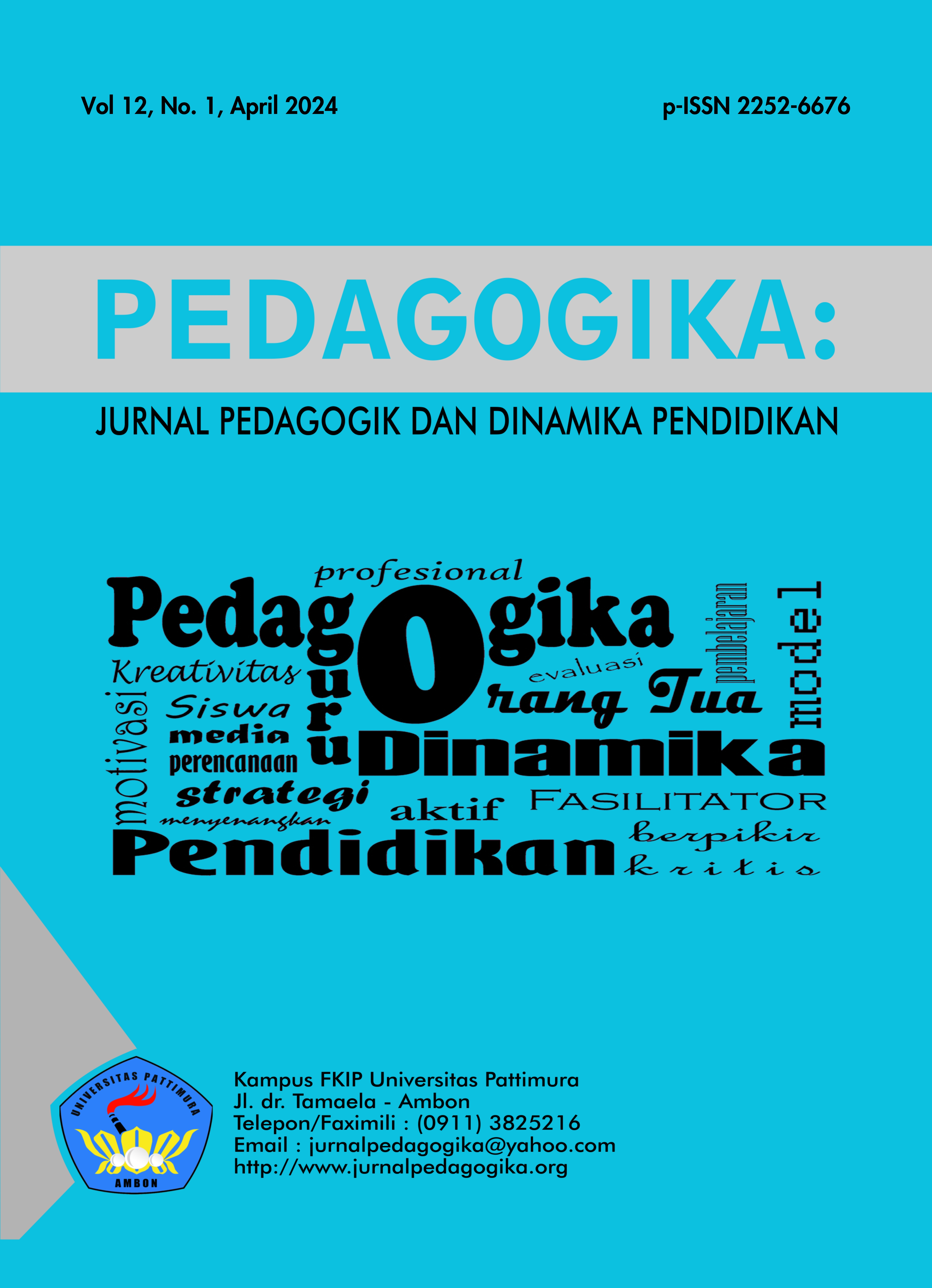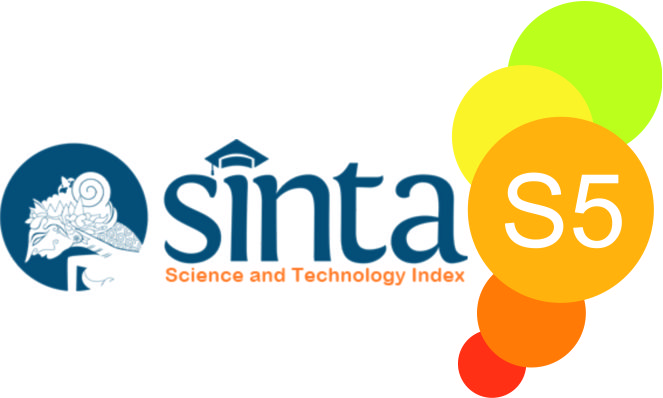THE INFLUENCE OF THE CONTEXTUAL TEACHING AND LEARNING MODEL ON FRACTION LEARNING OUTCOMES AT STATE ELEMENTARY SCHOOL 1 KAMARIAN, SERAM BAGIAN BARAT PROVINSI MALUKU
Abstract
This research aims to determine the effect of the Contextual Teaching and Learning (CTL) learning model on fraction learning outcomes. The method used is quantitative with a quasi-experimental type of research and is designed using one group pretest-posttest. The research involved fifth-grade students at Kamarian 1 State Elementary School, West Seram Regency. The research results show that there is an influence of the CTL model on fraction learning outcomes. The use of the CTL model can improve fraction learning outcomes, where the average increase in the high category is 71%, medium 48%, and low 29%. The increase is due to the effective use of contextual models, where with contextual learning students can relate the real world to mathematical problems. Contextual learning can facilitate students to see the meaning of the problems they encounter and can relate these problems to the students' real-life context.
Downloads
References
Abdul Gafoor, K., & Kurukkan, A. (2015). Why High School Students Feel Mathematics Difficult? An Exploration of Affective Beliefs. Paper presented In UGC Sponsored National Seminar on Pedagogy of Teacher Education- Trends and Challenges At Farook Training College, Kozhikode, Kerala. Online (Tersedia): https://files.eric.ed.gov/fulltext/ED560266.pdf
Afni, N., & Hartono. (2020). Contextual teaching and learning (CTL) as a strategy to improve students’ mathematical literacy. Journal of Physics: Conference Series,1581(1), 1-8. https://doi.org/10.1088/1742-6596/1581/1.
Bahri, S. (2017). Pengaruh Penerapan Model Pembelajaran Contextual Teaching And Learning (CTL) Tipe Inquiry Terhadap Kemampuan Berpikir Kritis. AL-Tadzkiyyah. Jurnal Pendidikan Islam, 8(1), 45-59.
Creswell, J. W. (2010). Research Design Pendekatan Kualitatif, Kuantitatif, dan Mixed. Pustaka Pelajar Edisi Ketiga
Dahar, R. W. (2011). Teori belajar dan pembelajaran. Jakarta: Erlangga.
Gazali, R. Y. (2016). Pembelajaran Matematika Yang Bermakna. Math Didactic: Jurnal Pendidikan Matematika Vol 2(3).
Hyun, C. C., Wijayanti, L. M., Asbari, M., Purwanto, A., Santoso, P. B., Wardani, I. G. K., & Pramono, R. (2020). Implementation of contextual teaching and learning (CTL) to improve the concept and practice of love for faith-learning integration. International Journal of Control and Automation,13(1), 365-383.
Johnson, E.B. (2008). Contextual teaching & learning menjadikan kegiatan belajar-mengajar mengasyikkan dan bermakna. Bandung: Mizan Learning Center (MLC).
Johnson, E. B. (2002). Contextual teaching and learning. Thousand Oaks, CA: Corwin Press.
Nopyanti, Y., Novtiar, C., & Hidayat, W. (2023). Pengaruh Pembelajaran Kontekstual Terhadap Kemampuan Berpikir Kritis Matematis Pada Materi Sistem Persamaan Linear Tiga Variabel. Jurnal Pembelajaran Matematika Inovatif 6(6). 2011-2020.
Pattimukay, N., Takaria, J., & Ishabu, L. S. (2023). The Effect Of The Flipped Classroom Model On The Mathematical Critical Thinking Ability Of Elementary School Students. Jurnal Pendidikan Matematika (JUPITEK), 6(1), 49-54.
Samosir, B. S., Agustina, L., & Hudyansah, T. (2019). Pengaruh Model Pembelajaran Kontekstual Terhadap Kemampuan Berpikir Kreatif dan Hasil Belajar Siswa. Jurnal Pendidikan Karya Matematika, 6(2), 1-7.
Samo, D, D., Darhim., Kartasasmita, B. (2017). Developing Contextual Mathematical Thinking Learning Model to Enhance Higher-Order Thinking Ability for Middle School Students, International Education Studies; Vol 10(12).
Scarpello, G. (2007). Helping Students Get Past Math Anxiety. Techniques: Connecting Education and Careers (J1), 82(6), 34-35.
Saputra, H., Maulina, S., Mirunissa., Razi, S. (2022). The Effect Of Contextual Teaching And Learning On Students’ Conceptual Understanding Of Geometry. Jurnal Sains Riset, 12(3), 719-724.
Saragih, D. I., & Surya, E. (2017) Analysis of the Effectiveness of Mathematics Learning Using Contextual Learning Model. International Journal of Science: Basic and Applied Research (IJSBAR), 34(1), 135-143.
Shanti, W. N., Sholihah, D. A., & Abdullah, A. A. (2018). Meningkatkan Kemampuan Berpikir Kritis Melalui CTL. Jurnal Elektronik Pembelajaran Matematika 5(1), 98-110.
Syaifuddin, A., Nurlaila, L., & Sukma Perdana, P. (2021). Contextual Teaching and Learning (CTL) Model To Students Improve Learning Outcome at Senior High School of Model Terpadu Bojonegoro. IJORER: International Journal of Recent Educational Research, 2(5), 528-535.
Zakaria, J. (2019). Pemahaman Konsep Volume Bangun Ruang Melalui Hukum Kekekalan Isi. Jurnal Pedagogika dan Dinamika Pendidikan, Vol 7 (1).
Takaria, J., & Talakua, M. (2018). The Ability Of Statistical Literacy Student Teacher Candidate In Terms Of Prior-Ability On Mathematics. Jurnal Kependidikan Penelitian Inovasi Pembelajaran, 2(2), 395-408.
Copyright (c) 2024 PEDAGOGIKA: Jurnal Pedagogik dan Dinamika Pendidikan

This work is licensed under a Creative Commons Attribution-NonCommercial-ShareAlike 4.0 International License.









 This work is licensed under
This work is licensed under 